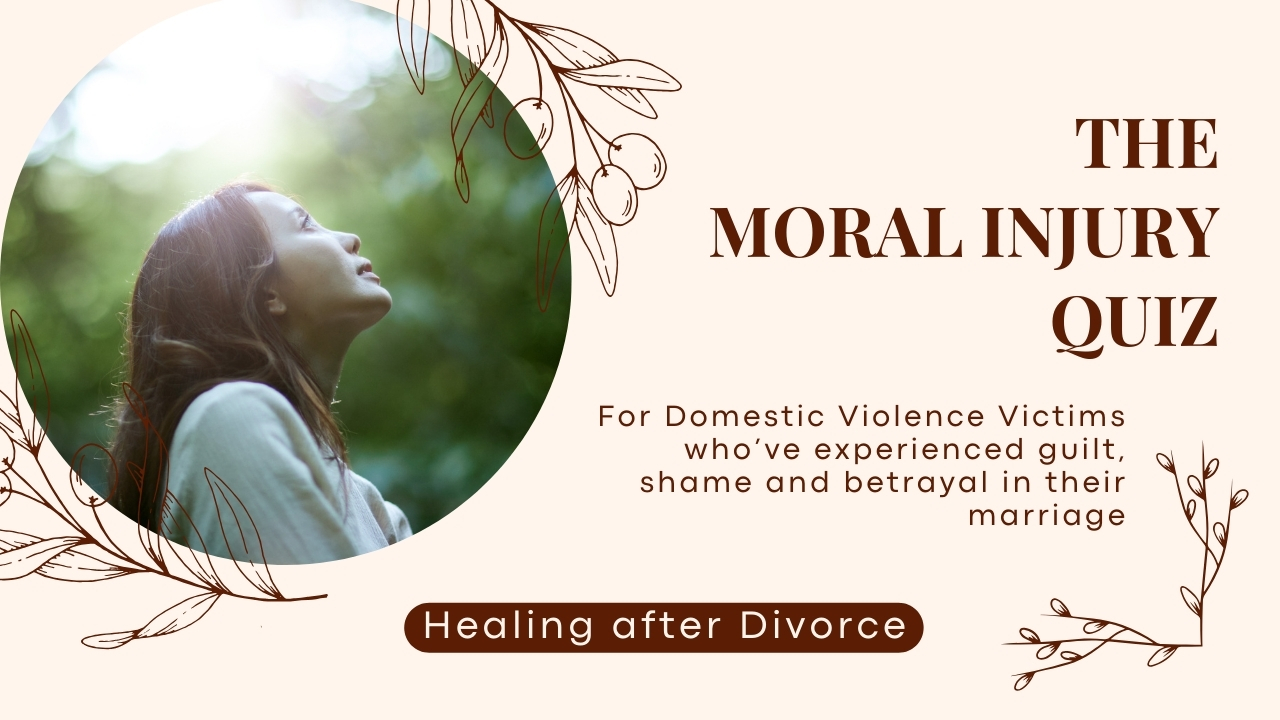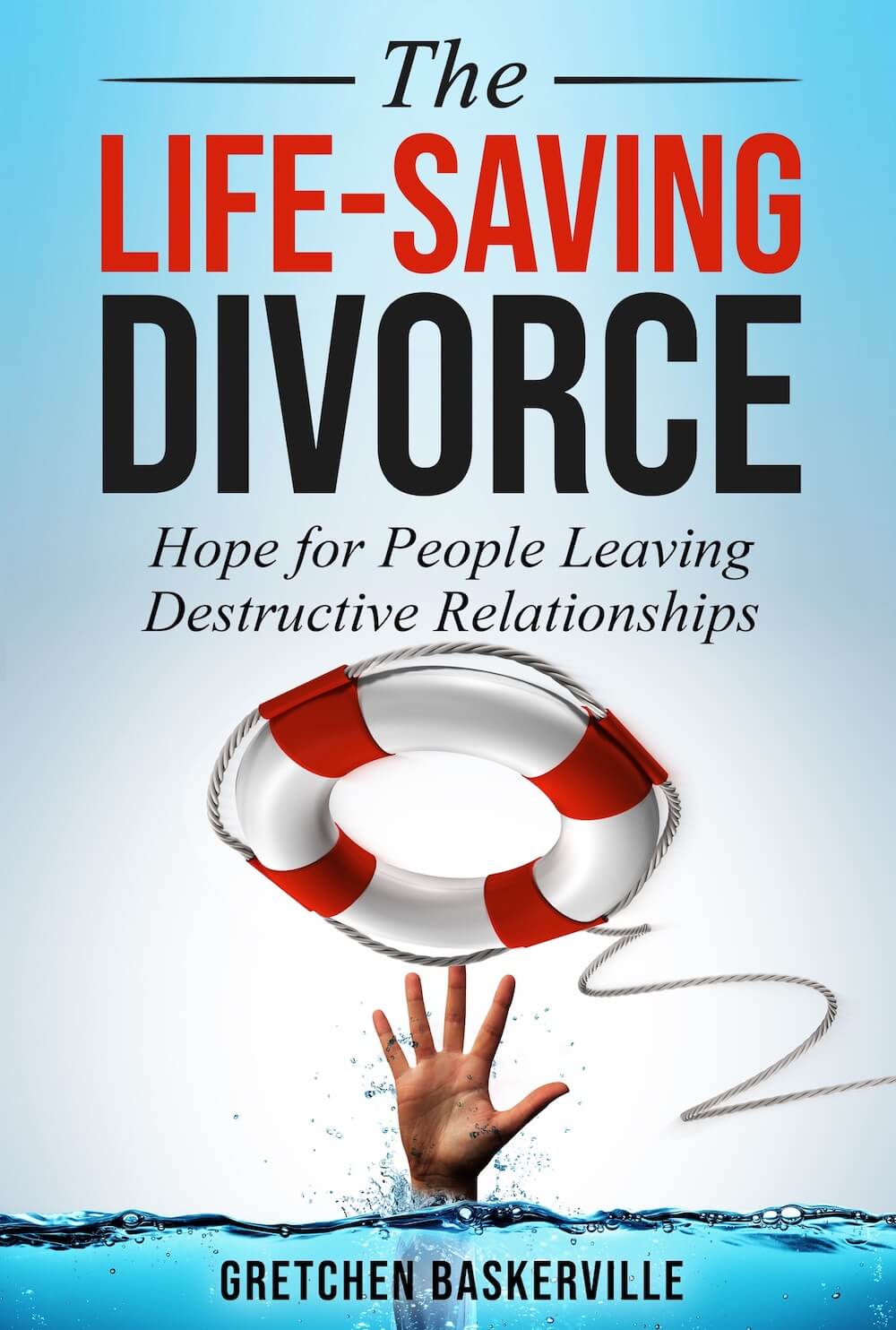Moral Injury and Christian Abuse Survivors who Divorce
Scroll down to the Moral Injury Quiz below.
What is Moral Injury?
The concept of “Moral injury” refers to the psychological distress that arises when an individual’s deeply held moral beliefs and ethical standards are violated, often due to circumstances beyond their control.
The concept of moral injury was first coined in the 1990s, specifically in the context of military veterans. The term was based on narratives from veterans who described feelings of betrayal by leaders or institutions in high-stakes situations, which violated their deeply held moral beliefs. See some academic studies here, here, here, here, and here. The studies can be difficult to understand without a background in academic statistics, so this in an A. I. explanation of some key points from these studies.
3 Components of “Moral Injury”
(1) a betrayal of what is morally right,
(2) by someone holding legitimate authority,
(3) in a high-stakes situation, such as combat or a home with abuse
In the context of domestic violence survivors, moral injury can result from coercive control, abuse, or situations where survivors feel they were commanded by their church leaders to stay in an unsafe situation, and to cover up for their destructive spouse, which compromised their moral integrity to survive. This injury is characterized by profound feelings of guilt, shame, betrayal, and loss of trust in oneself or others.
Moral Injury In Highly Religious Homes
Nothing could be a higher stakes situation than a home and marriage where there is sexual immorality, criminality, addiction, violence, or emotional abuse. Moral injury can be compounded by feelings of betrayal when their religious or spiritual beliefs fail to align with their lived experiences. Survivors who have been taught by their church or faith community that adhering to specific moral codes or rules would guarantee a loving, intimate, and harmonious marriage may feel deeply disillusioned and betrayed when they find themselves in abusive relationships. This disconnect between their expectations and reality can exacerbate the psychological distress associated with moral injury.
Are you experiencing “moral injury” in your church or marriage? Scroll down and take the quiz below.
Moral Injury by the Court and Legal System
Family Law Court has authority over division of assets and child custody. And the expectation is that it will be fair and be able to identify dangerous situations. Family law courts can do moral injury by not acknowledging when the other parent acts spitefully. When the court betrays the children by failing to shield them from hurtful actions of the other parent, or when the court forces a fit protective parent to accept unfair rulings, this can leave deep emotional pain from feeling powerless to protect their children.
Betrayal by Religious Teachings and Leaders
For many survivors, religious teachings often emphasize ideals such as:
- Obedience to moral rules: Living virtuously, being a good spouse, and following prescribed behaviors.
- Marriage as sacred and unbreakable: Viewing marriage as a divine covenant that should be preserved at all costs, even if in involves severe physical or emotional injury or betrayal to spouse and children.
- Promises of blessings: Belief that a faithful, rule-following life will result in a loving and fulfilling relationship.
When survivors experience abuse despite living according to these teachings, they may feel:
- Betrayed by their faith: Wondering why their adherence to religious principles of faith, obedience, prayer, and fasting did not protect them from harm.
- Disillusioned with God or their church: Questioning why a loving God would allow them to suffer in an abusive marriage.
- Shame and self-blame: Believing they must have failed morally or spiritually, even though the abuse is not their fault.
- Isolation from their faith community: Experiencing or feeling judged or unsupported by others in their church who may encourage them to stay in the marriage rather than escape the abuse.
How Betrayal Impacts Moral Injury
This betrayal can deepen the moral injury by creating spiritual conflict and existential distress. Survivors may feel abandoned by both their faith and their community, leading to:
- Loss of meaning: Struggling to reconcile their suffering with the promise of divine love and protection.
- Anger toward God or religious leaders: Resentment for teachings that contributed to staying in an unsafe situation.
- Difficulty trusting spiritual guidance: Doubting whether religious authorities truly understand or care about their plight.
Healing from Betrayal and Moral Injury
Recovery from this form of moral injury requires addressing both the trauma of abuse and the spiritual disillusionment survivors may experience. Key steps include:
- Reframing beliefs: Helping survivors understand that abuse is never their fault and that suffering does not mean they failed spiritually.
- Supportive faith communities: Connecting survivors with compassionate spiritual leaders or groups who validate their experiences and encourage healing.
- Restoring agency: Empowering survivors to make choices that prioritize safety and well-being over rigid adherence to harmful teachings.
- Exploring spirituality on new terms: Encouraging survivors to redefine their relationship with faith in ways that align with self-compassion and healing.
By addressing both the psychological and spiritual dimensions of moral injury, survivors can begin to rebuild trust in themselves, others, and potentially even their faith.
Quiz on Moral Injury for Domestic Violence Survivors
(This quiz was written by Perplexity A.I.)
Here’s a Moral Injury Symptom Scale for IPV Victims, written to reflect the unique struggles of domestic abuse survivors:
Moral Injury Symptom Scale
—Abuse Survivor Version
Introduction:
The following statements describe common feelings of people who have experienced intimate partner violence (IPV). These questions focus on your relationship experiences and how you feel now. Circle a number between 1 and 10 for each (“strongly disagree” to “strongly agree”):
Guilt
1. I feel guilty for staying in the relationship longer than I should have.
2. I feel guilty about things I did to survive the abuse (e.g., lying, hiding the truth).
3. I’m troubled by times I lashed out verbally or physically during the abuse.
4. I feel guilty for not protecting others (e.g., children, pets) from my partner.
Shame
5. If people knew the full story of my relationship, they would look down on me.
6. I feel ashamed that I didn’t leave sooner.
7. I feel ashamed of how the abuse changed me (e.g., becoming withdrawn, angry).
Betrayal
8. I feel betrayed by my partner, who I once trusted deeply.
9. I feel betrayed by friends/family who didn’t help me when I needed it.
10 I feel betrayed by institutions (e.g., church, pastor, church counselors, the court) that failed to protect me.
Violation of Moral Values
11. I’m haunted by things my partner made me do against my values.
12. I’m troubled by actions I took to survive that violated my morals (e.g., stealing, lying).
13. I’m angry at myself for ignoring “red flags” in the relationship.
Loss of Meaning
(“Absolutely untrue” to “Absolutely true”)
14. I struggle to find purpose in life after the abuse.
15. My life feels empty compared to how it was before the relationship.
16. I no longer recognize who I am.
Difficulty Forgiving
17. I can’t stop criticizing myself for choices I made during the abuse.
18. I hold grudges against myself for “letting” the abuse happen.
19. I can’t forgive others who witnessed the abuse but did nothing.
Loss of Trust
(“Strongly disagree” to “Strongly agree”)
20. I no longer trust my own judgment about people.
21. I believe most people would hurt me if given the chance.
22. I feel unsafe in relationships now.
Self-Condemnation
23. I feel permanently damaged by the abuse.
24. I see myself as weak for not escaping sooner.
25. I feel like a failure because of how the relationship ended.
Spiritual/Existential Struggles
(“Not at all” to “A great deal”)
26. I question why a loving God allowed the abuse to happen.
27. I feel abandoned by my faith/community during the abuse.
28. The abuse made me doubt my beliefs about love or justice.
Scoring & Notes
- Reverse-score items: 14–16 (loss of meaning), 24 (self-condemnation).
- Interpretation: Higher total scores (45–450) indicate greater moral injury severity.
- Key differences from military version: Focuses on betrayal by intimates/institutions, self-blame for “failure” to leave, and erosion of identity/trust.
This adaptation addresses IPV-specific moral injuries like coerced complicity, institutional betrayal, and internalized stigma136. It retains the original scale’s structure while replacing combat-related items with experiences of entrapment, gaslighting, and post-abuse alienation27.
Practical Steps to Healing From Moral Injury
A book such as “The Life-Saving Divorce” and the website https://LifeSavingDivorce.com can assist Christian domestic violence survivors in navigating the challenging path to emotional and spiritual health in several ways:
- Validating Experiences: Both the book and website affirm that divorce can be a necessary and morally acceptable option in situations involving abuse, infidelity, family-crushing addictions, or severe neglect. This validation is crucial for survivors who may have been taught that divorce is always wrong, providing reassurance that seeking safety and well-being is not a sin but a life-saving decision.
- Dispelling Harmful Myths: The resources address and debunk common misconceptions about divorce within religious communities, such as the idea that staying together “for the kids” is always best or that divorce is an unforgivable sin. By challenging these myths, survivors can liberate themselves from feelings of guilt, shame, and fear of judgment.
- Providing Biblical Support: “The Life-Saving Divorce” offers interpretations of scripture that support the possibility of divorce in abusive situations. This biblical grounding can help survivors reconcile their faith with their decision to leave a destructive marriage, alleviating spiritual conflict.
- Offering Practical Guidance: The website and book provide concrete steps and advice for navigating the practical challenges of divorce, such as dealing with disapproving family members, finding supportive communities, and co-parenting with an abusive ex-partner. This guidance helps survivors feel less overwhelmed and more empowered to take control of their lives.
- Fostering Community and Connection: Through resources like online groups, featured interviews, and podcasts, the website creates a sense of community for survivors who may feel isolated and alone. Connecting with others who have similar experiences can reduce feelings of shame and provide encouragement and hope for healing.



 :
:
 Buy PDF
Buy PDF